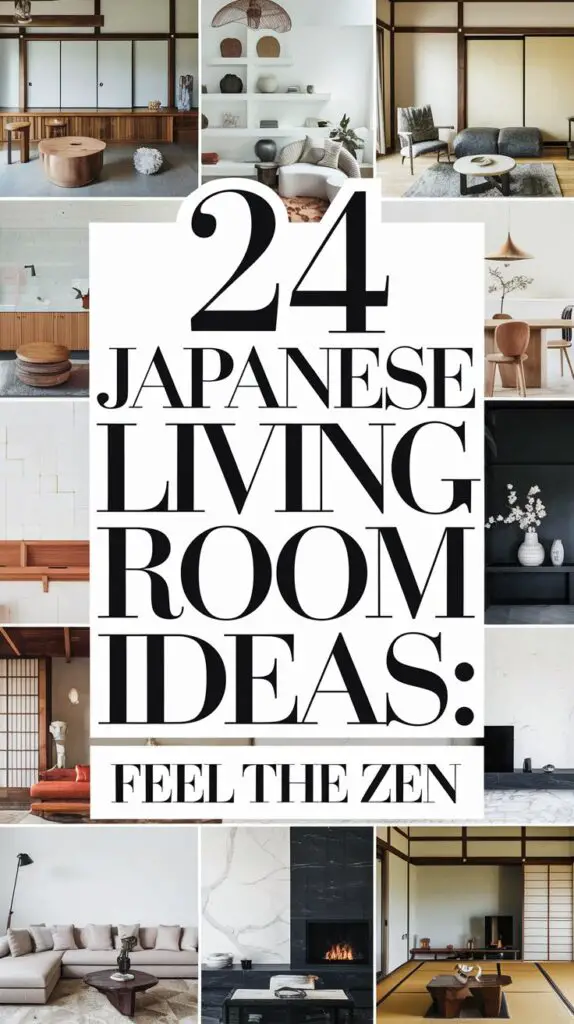Are you fascinated by Japanese interiors? You’re not alone.
Japanese living rooms highlight simplicity, nature, and calm. These elements are perfect for our busy lives.
Whether you want a full minimalist makeover or just a hint of Japanese style, this guide is here to help. It will turn your space into a peaceful retreat.
In this post, we showcase 24 ideas for Japanese living rooms. Each idea blends classic design with practical beauty.
You’ll see everything from simple furniture to Zen décor.
1. Natural Materials
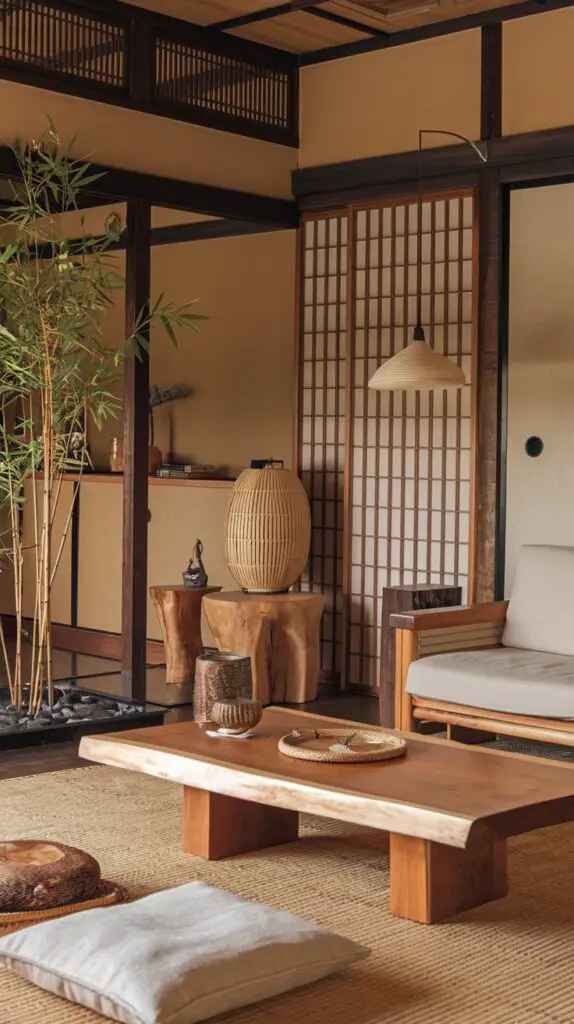
Using natural materials like wood and bamboo in your living room creates a warm, inviting feel.
These materials look great and bring a touch of nature indoors, making your space more relaxing.
Wooden furniture and bamboo decorations are durable.
They resist wear and tear better than many synthetic options, making them a smart investment. Plus, they add a timeless, classic look to your living room.
Incorporating natural materials into your design is eco-friendly.
Wood and bamboo are renewable resources. Using them helps reduce the environmental impact of your décor, aligning with sustainable living principles.
2. Low Furniture
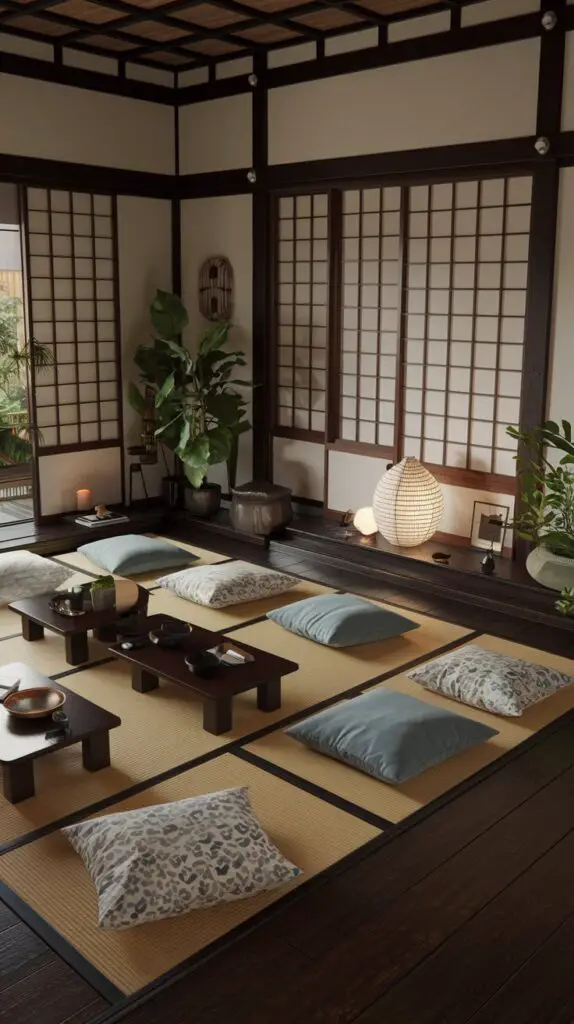
Think about using low furniture, like floor cushions, low tables, and sofas.
This choice helps make small living rooms feel open and spacious. It also adds a cozy touch of Japanese style to your space.
Low furniture creates a relaxed atmosphere.
Keeping items closer to the ground gives you a stylish and functional area. This setup is perfect for gatherings and family time, making your living room versatile.
Using low furniture maximizes space and highlights minimalist design. It reduces clutter and focuses on what matters, promoting a clean and calm environment.
This is a smart way to embrace Japanese style while efficiently using your space.
3. Sliding Doors
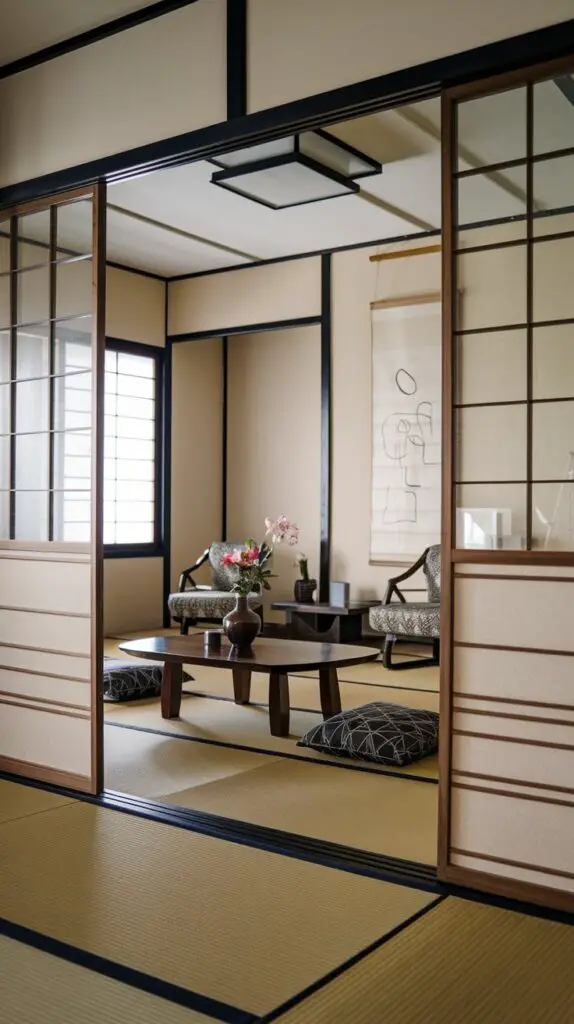
Using sliding doors in your living room saves space and adds a stylish Japanese touch. They don’t require extra room when opened, making them perfect for small areas.
Sliding doors also improve your living room’s look.
With beautiful designs and materials, they can match various interior styles, bringing unique charm to your space.
Another benefit of sliding doors is their versatility.
They let you create flexible living spaces. You can easily divide areas or open them up as needed, giving you both privacy and openness.
4. Neutral Colors
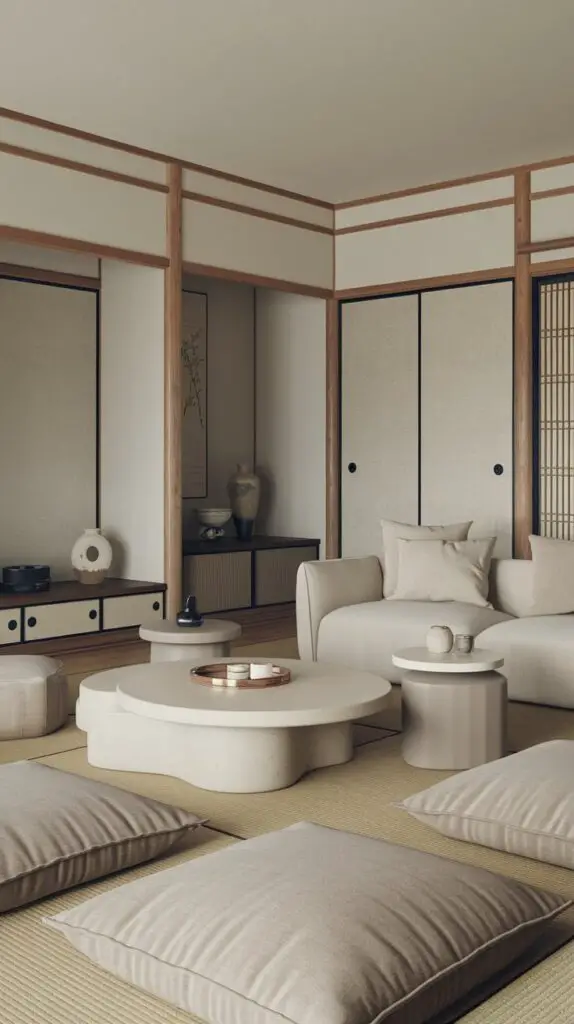
A neutral color palette in your living room, featuring white, beige, and grey, creates a calm and peaceful space.
These colors blend well, making the room feel more open and welcoming.
Using neutral tones highlights natural light, brightening the area and enhancing its spaciousness. This approach fosters a warm and inviting atmosphere in your home.
Neutral colors offer a flexible backdrop for your décor.
By choosing white, beige, or grey for walls and large furniture, you can easily add colorful accessories that fit different seasons or trends.
5. Minimal Décor
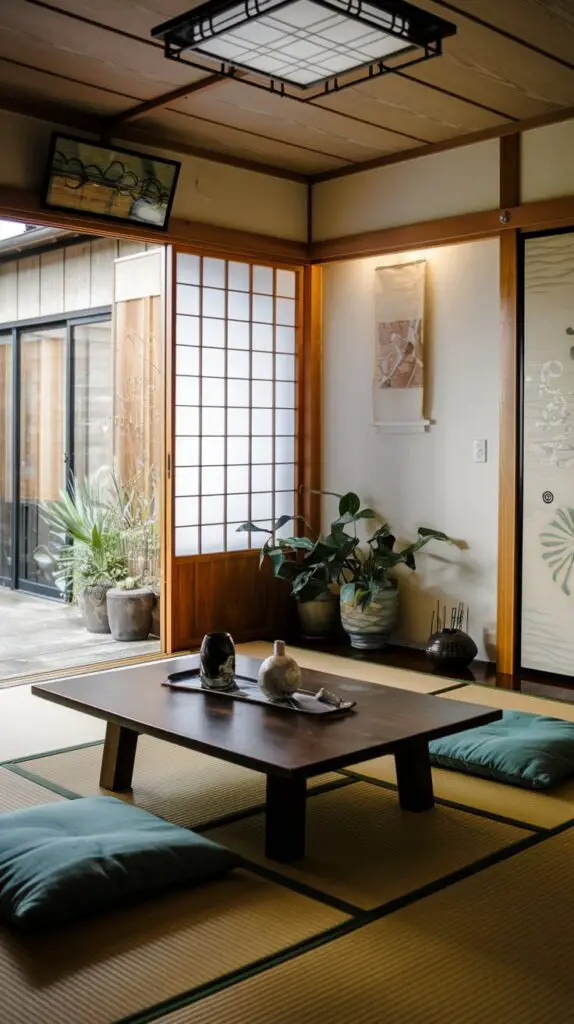
In a Japanese-style living room, less is more.
Choose a few standout items that reflect your personality. This approach keeps the space from feeling crowded. A single piece of art or a well-placed plant can make the room feel inviting.
Natural elements are vital in Japanese design.
Add touches of wood, bamboo, or stone to your living room. These materials look great and promote a sense of calm and connection to nature.
Furniture should be simple and functional.
Low tables, floor cushions, and streamlined sofas create a serene atmosphere. Select pieces with clean lines and neutral colors to keep the space open and airy.
6. Shoji Screens
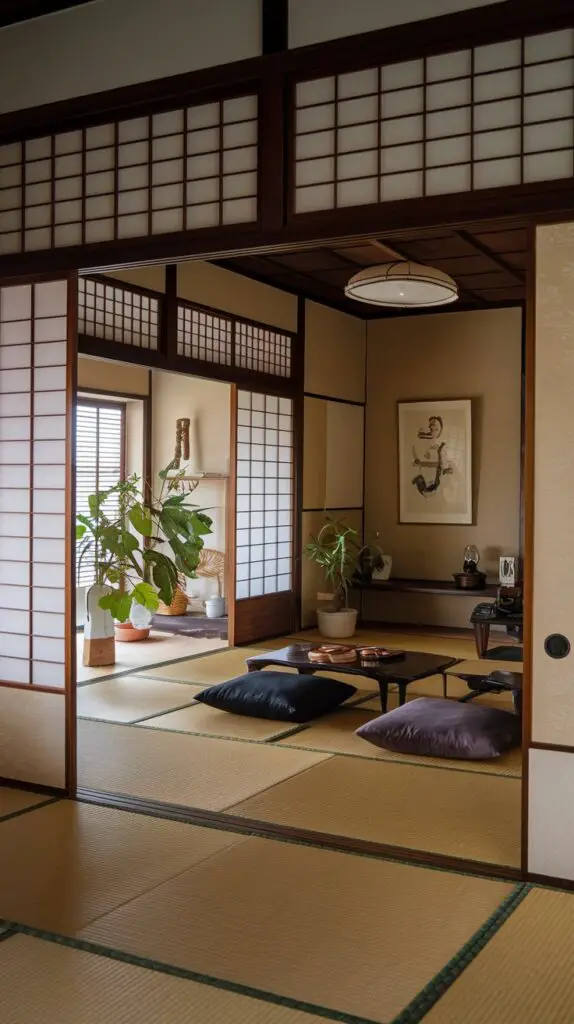
Shoji screens are both beautiful and practical.
They can divide a room while keeping it open. The translucent paper allows light to shine through, making the space bright and airy.
These screens suit a Japanese-style living room perfectly. They add authenticity and work well with traditional or modern décor.
You can also use them as window coverings for privacy while still letting in natural light.
Installing Shoji screens is an easy DIY project. They come in many sizes and designs, so you can choose what fits your space best.
Plus, they’re lightweight and easy to move, giving you flexibility in their use.
7. Tatami Mats
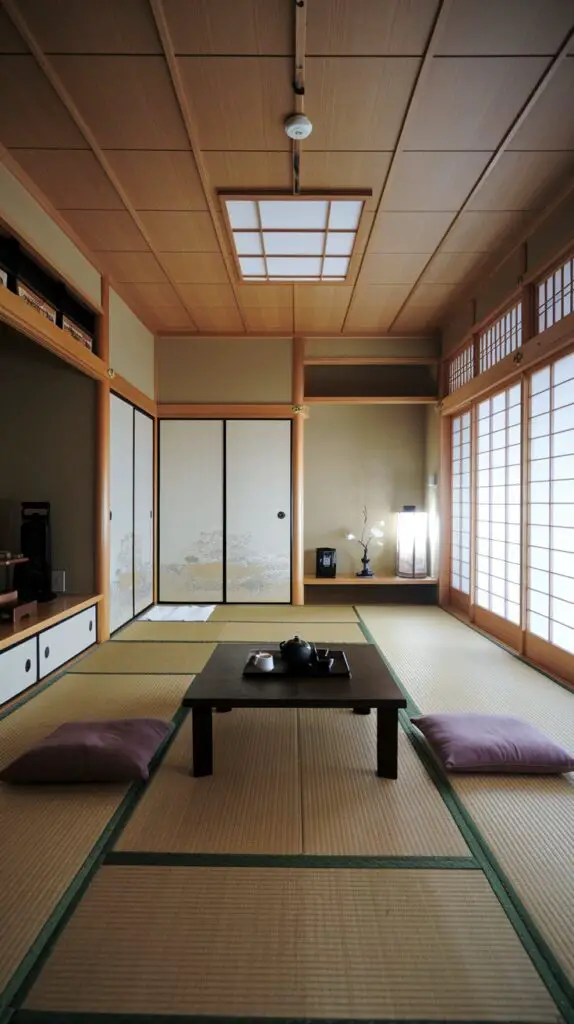
Tatami mats bring Japanese style to your living room. They feel soft and comfy underfoot, which helps create a cozy space.
Made from natural materials like rice straw and rush grass, these mats last a long time. They handle heavy foot traffic while keeping their shape and comfort.
Tatami mats are versatile too. You can fit them into many room layouts.
Whether you cover the whole floor or just a section, they can be arranged in various patterns to match your design.
8. Zen Garden
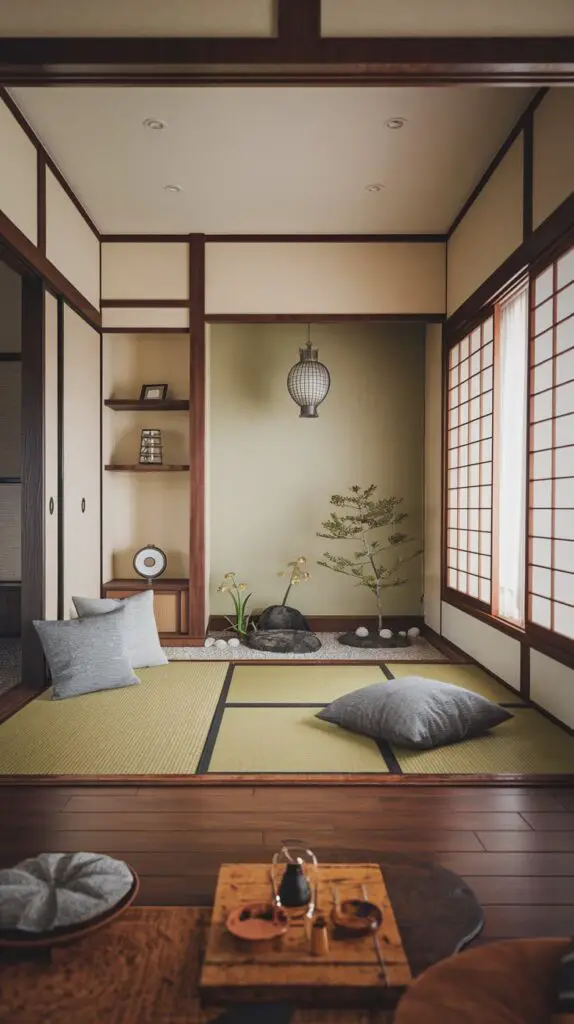
Creating a small indoor Zen garden is an easy DIY project. It adds tranquility to any room. Use sand, rocks, and small plants to form a calming landscape.
To improve your Japanese-style living room, place your Zen garden where it can be easily seen. You can change the arrangement of sand and rocks for a fresh look.
Maintaining your Zen garden is simple and needs little effort. Rake the sand occasionally to make new patterns.
Also, make sure the plants are well-watered. This care keeps the garden looking great and supports a peaceful vibe.
9. Paper Lanterns

Using paper lanterns in your living room creates a cozy feel. They emit gentle, warm light that is calming and inviting. This simple lighting solution can transform your space easily.
Paper lanterns also add Japanese elegance to your décor.
Their minimalist design and soft glow help create a serene, stylish atmosphere. You can find various shapes and sizes to match your room’s style.
Plus, paper lanterns are an affordable and eco-friendly option. Made from natural materials, they are easy to set up and can be reused for different occasions.
This makes them a practical choice for adding charm while being mindful of the environment.
10. Nature-Inspired Art
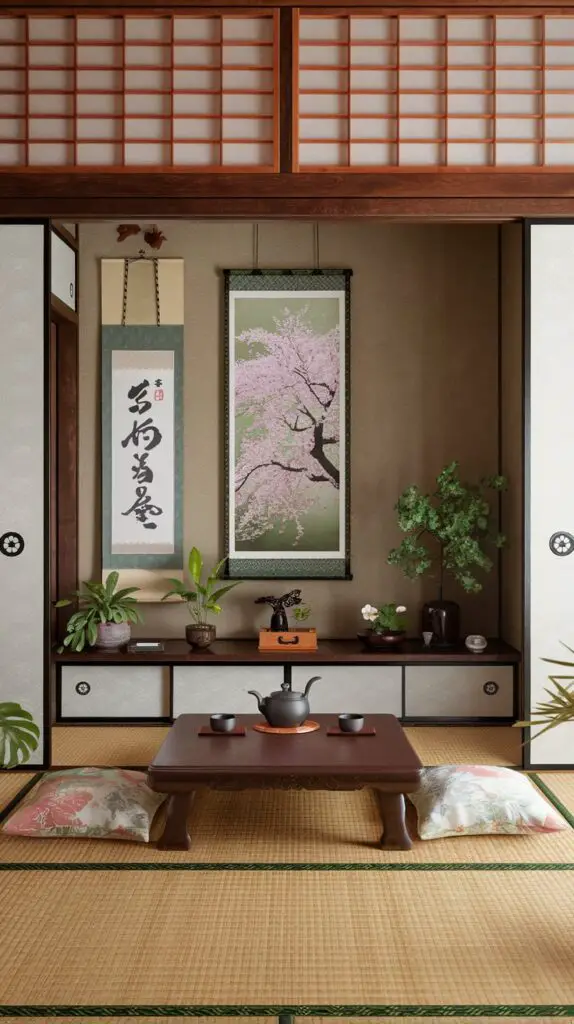
Adding nature-inspired art to your home creates a calming vibe.
Paintings of landscapes, flowers, and bamboo prints bring the outdoors inside. They can become focal points in your living room, enhancing your décor.
When choosing nature-inspired art, think about pieces that show the seasons.
Spring blossoms, summer greenery, autumn leaves, and winter scenes add variety. This keeps your décor fresh all year long and creates a dynamic living space.
Japanese-style living rooms often include nature elements.
Art featuring landscapes or natural scenes blends well with traditional Japanese décor, like tatami mats and shoji screens. This mix offers a serene and balanced environment.
11. Simple Shelving
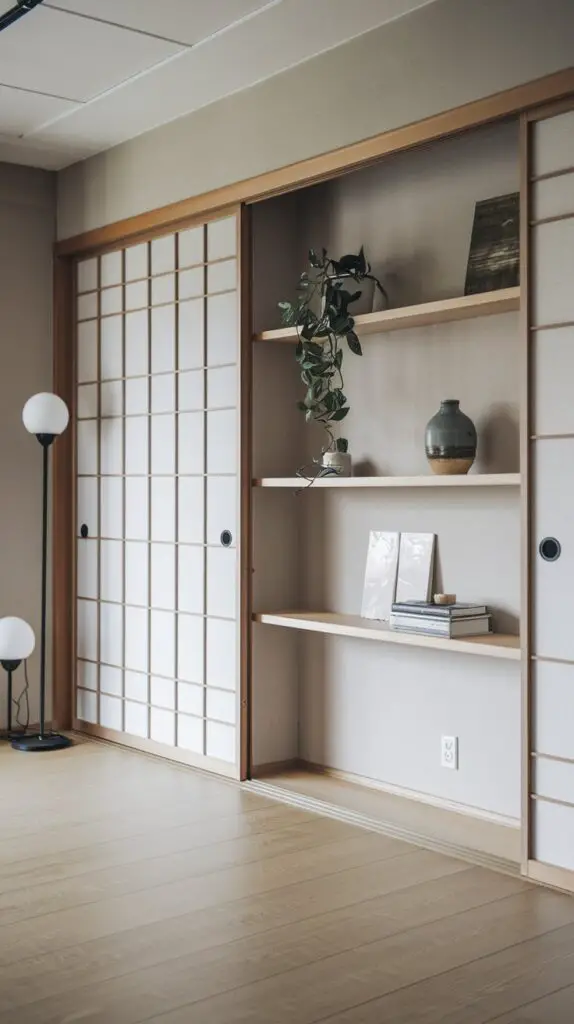
Simple, open shelving is great for showing off select items.
It gives your Japanese-style living room a tidy and organized look. Pick items like plants, books, or ceramics to add culture and personality.
With open shelving, you can easily change your living room’s look.
Swap items seasonally or whenever you want to refresh the space. This keeps your home dynamic and interesting.
Open shelves maximize space by providing storage without feeling cramped.
They blend into the room, making it look more spacious and airy. This is perfect for a Japanese-style living room.
12. Indoor Plants
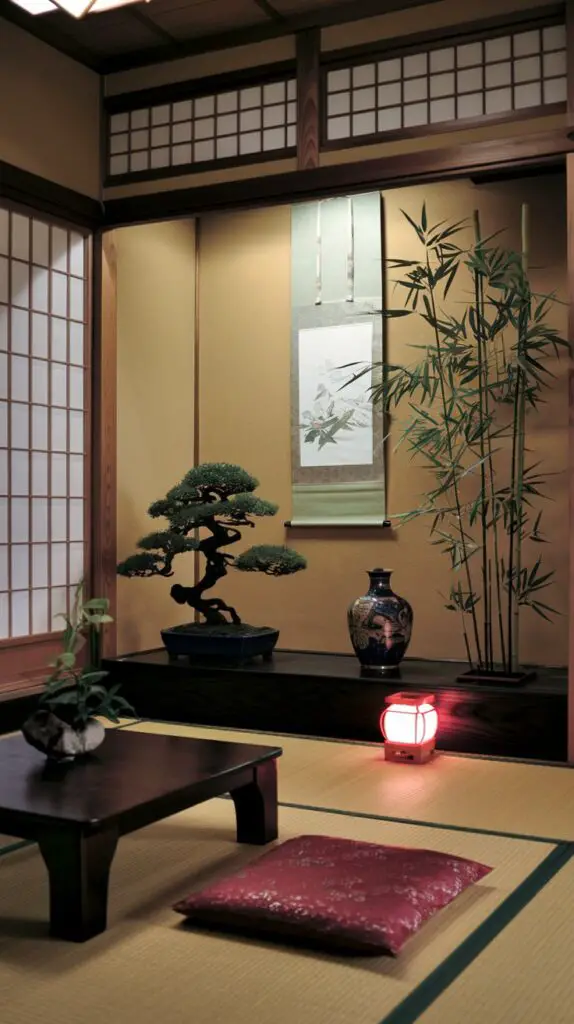
Adding indoor plants brings nature into your space.
For a Japanese-style living room, bonsai and bamboo are great choices. They enhance décor and create a calming atmosphere.
Bonsai and bamboo thrive indoors and need little care. They make a practical and beautiful addition to your home.
Using plants like bonsai or bamboo in your living room elevates the design. These plants symbolize peace and balance, fitting perfectly with Japanese décor principles.
13. Floor Seating
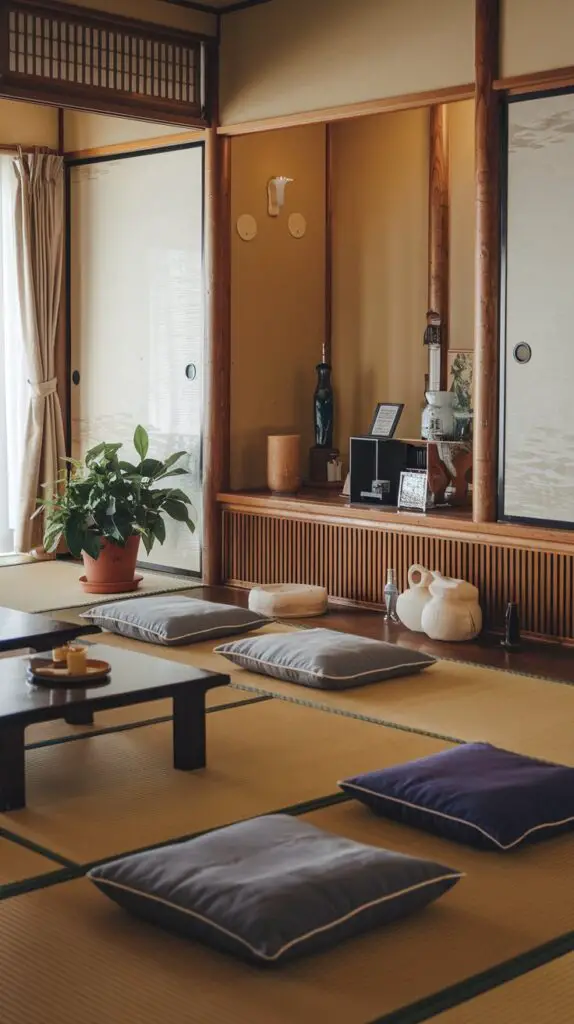
Add floor seating with cushions and low tables for a cozy feel. This setup saves space and adds Japanese style to your living room.
Using cushions and low tables makes your living room inviting and comfy. It’s a great way to bring Japanese style into your space, creating a relaxed area for family and friends.
Think about adding floor seating with cushions for a warm vibe. This arrangement is both practical and stylish, ideal for those wanting Japanese-style living room ideas.
14. Wooden Accents
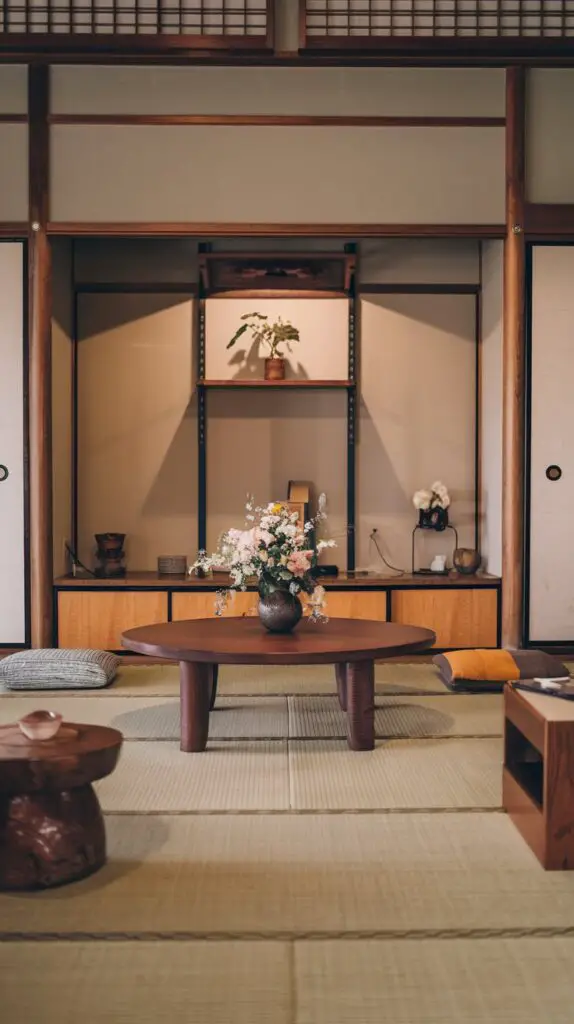
Adding wooden accents to your living room brings nature indoors. Wooden frames for photos or artwork create a cozy feel, making your space inviting.
Use wooden shelves to display your favorite items. These shelves add function and style, offering rustic charm that suits a Japanese-style living room.
Small wooden furniture pieces, like stools or side tables, enhance your living room’s look. These accents blend well with other décor, creating a balanced space.
15. Futon Sofa
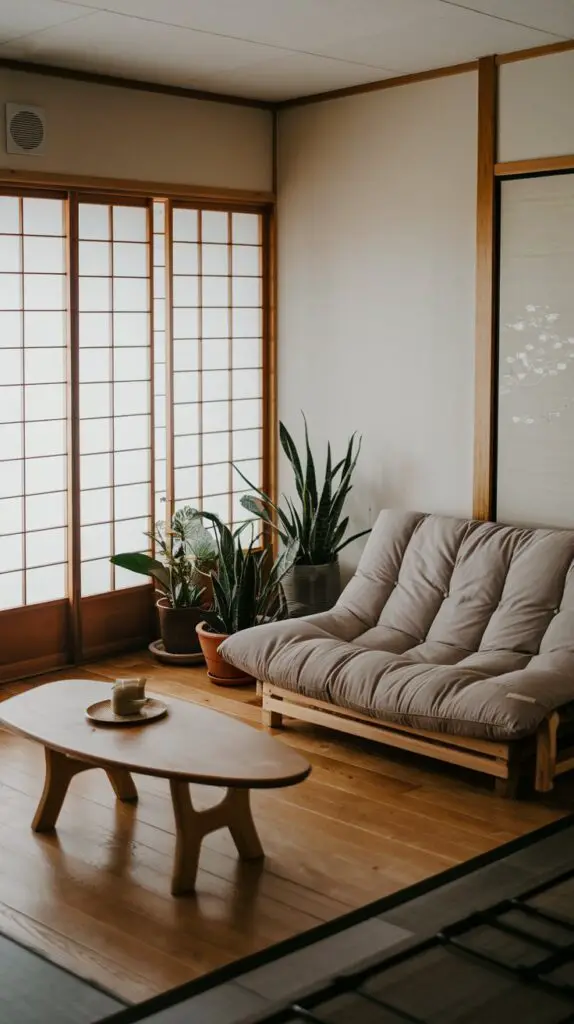
Swap your traditional sofa for a futon. It’s comfy, versatile, and fits well with a minimalist style.
Futons save space and easily change from a sofa to a bed. This makes them perfect for small living rooms.
Futons bring a hint of Japanese design to your space.
They combine simplicity and practicality. Their sleek look matches modern, minimalist décor, helping keep your area clean and tidy.
Beyond their stylish vibe, futons are budget-friendly. They usually cost less than traditional sofas and can last for years with care.
This makes them a smart pick for those wanting to refresh their living room without overspending.
16. Neutral Textiles
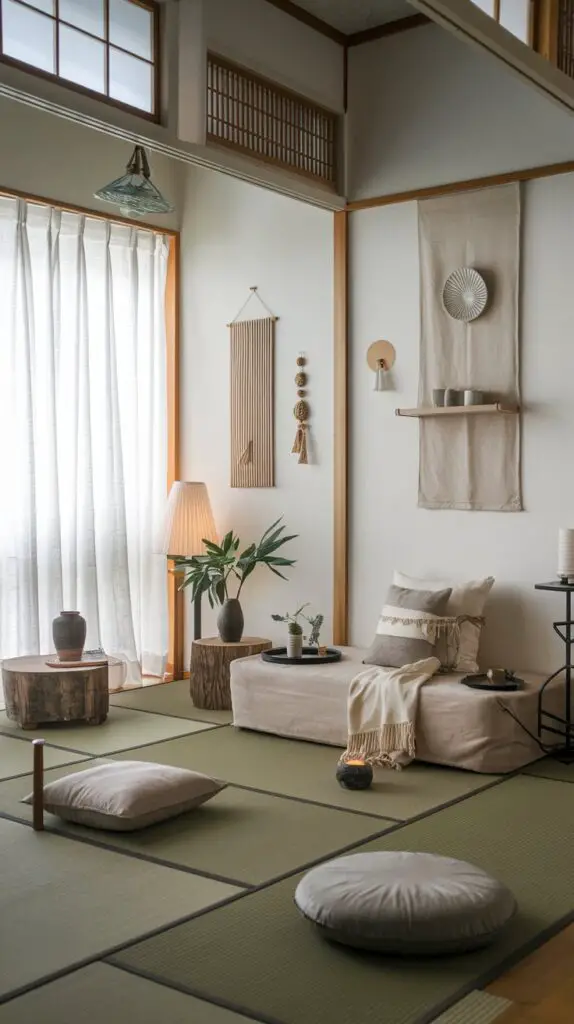
Choosing neutral textiles for your living room creates a peaceful atmosphere.
Tones like beige, gray, and white blend well with different styles. They also make the space feel larger and calmer.
Neutral cushions, rugs, and curtains provide a versatile base for your room.
You can easily update these with seasonal or trendy accents. This lets you refresh your room’s look without a major change.
By using neutral textiles, you promote a balanced design.
This keeps the room stylish and timeless. It also offers a great backdrop for any décor or personal touches you want to add.
17. Simple Lighting
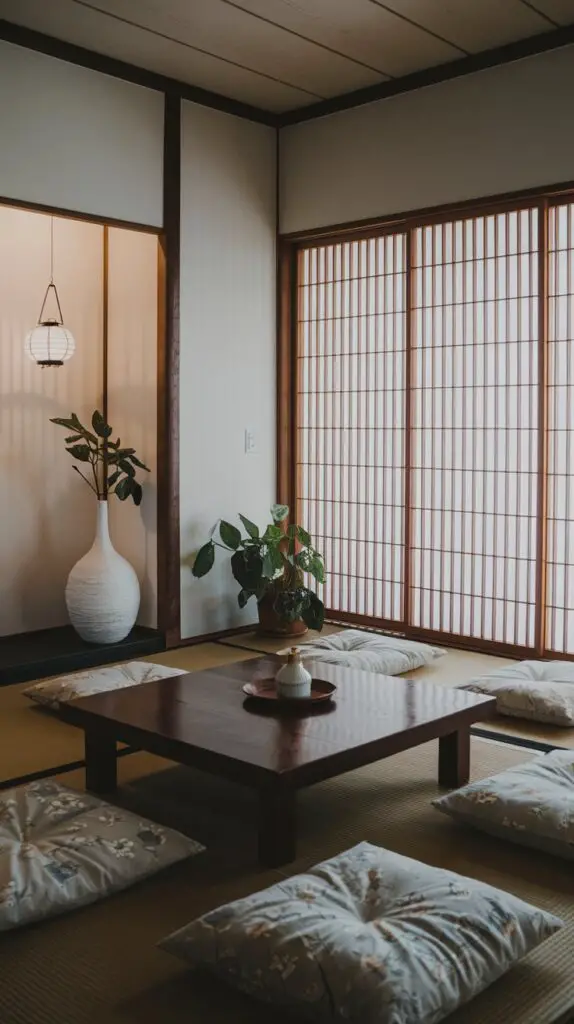
Simple lighting fixtures are essential for a minimalist look in a Japanese-style living room.
Choose basic designs like pendant lights or wall sconces. They provide enough light without being too flashy.
When selecting lighting, think about natural light sources. Large windows and sliding doors let in daylight. This creates a calm, open feel without needing too much artificial light.
For evening lighting, pick warm, soft light bulbs.
They help create a cozy atmosphere. Paper lanterns or floor lamps with fabric shades add a touch of traditional Japanese elegance while keeping it simple.
18. Tea Corner
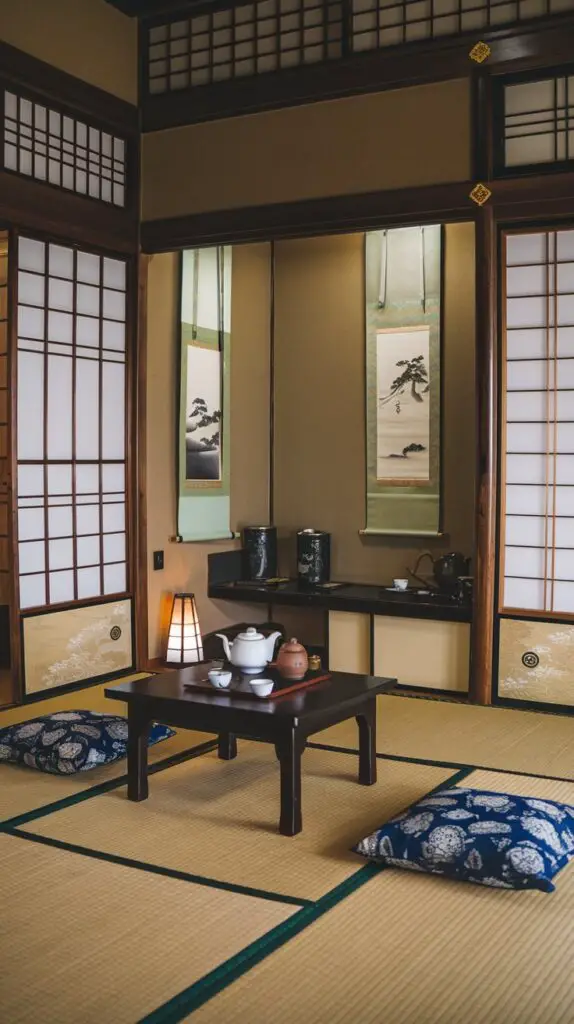
Creating a small tea corner with a low table and cushions adds coziness to your home.
This setup is perfect for relaxing and enjoying tea, giving your living room a Japanese touch.
A tea corner is a great addition to any home.
It provides a peaceful place to unwind. You can enhance the calming atmosphere by adding traditional Japanese elements like tatami mats and shoji screens.
For an authentic experience, add a small shelf for your tea sets and accessories.
This keeps everything organized and boosts the aesthetic of your Japanese-style living room.
19. Washi Paper Décor
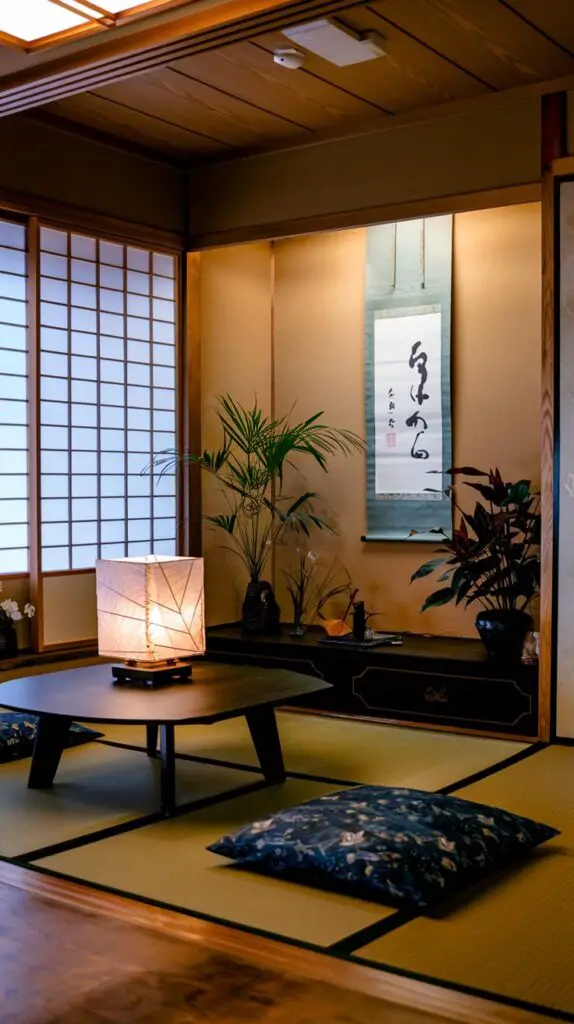
Washi paper is known for its rich texture and strength. It makes a great addition to your living room. It adds Japanese tradition, elegance, and a unique feel to your décor.
You can use Washi paper for lampshades or wallpaper.
This instantly changes your living space. Its natural fibers diffuse light well, creating a warm atmosphere that enhances a Japanese-style living room.
Another creative idea is to use Washi paper for room dividers or framed art.
These elements add visual interest and harmony, helping to create a calm, cohesive look in your home.
20. Minimalist Art
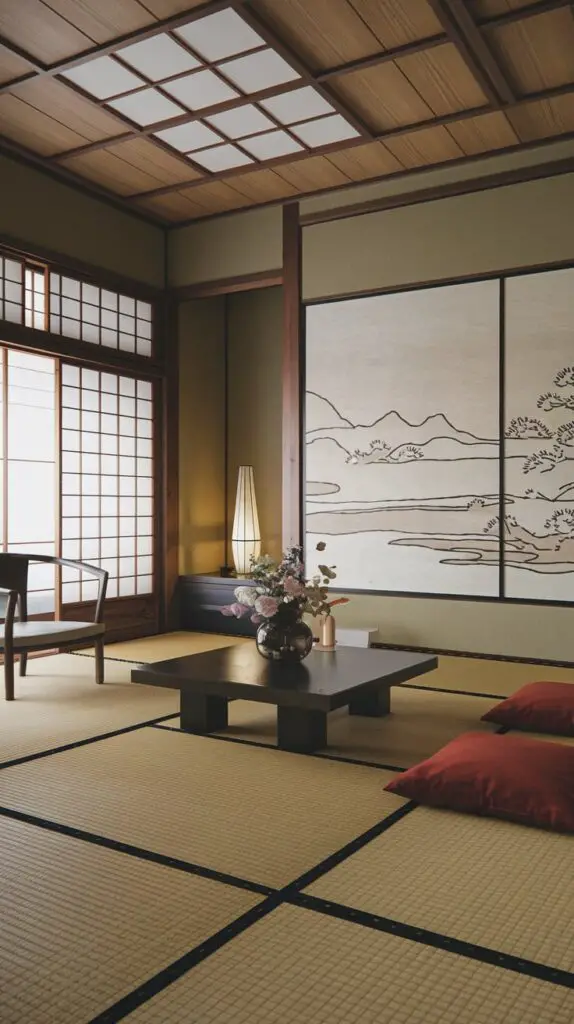
Choosing minimalist art for your Japanese-style living room boosts its peaceful vibe.
Simple line drawings or abstract pieces are ideal. They add to the calm atmosphere without crowding the space.
Minimalist art helps keep a clutter-free environment.
Choose pieces with neutral colors or simple shapes. This keeps the room looking clean and harmonious. It also supports the overall organized feel of a Japanese-style living room.
Another approach is to select art that reflects nature.
Pieces featuring gentle waves, mountains, or trees can bring nature indoors. This complements the tranquil design of a Japanese-style living room.
21. Floor Lamps
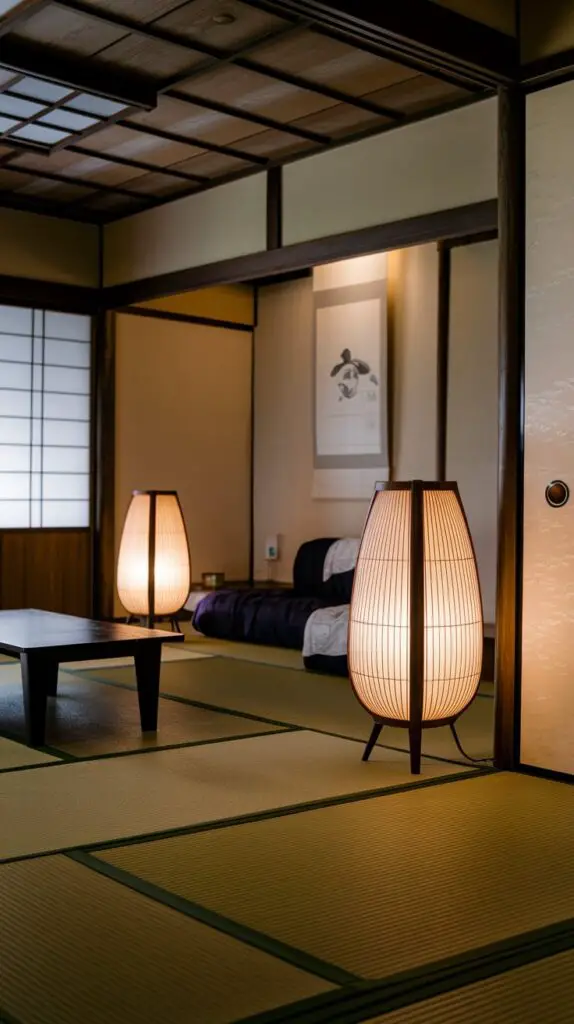
Elegant floor lamps add sophistication to your living room and provide soft, ambient light. They suit minimalist designs, making your space look clean and uncluttered.
The right floor lamp can enhance a Japanese-style living room. Choose simple designs with natural materials like wood or bamboo to match the serene vibe.
Placement is key for floor lamps. Put them near seating areas or in corners to create cozy spots that invite relaxation and conversation.
22. Wall Niches
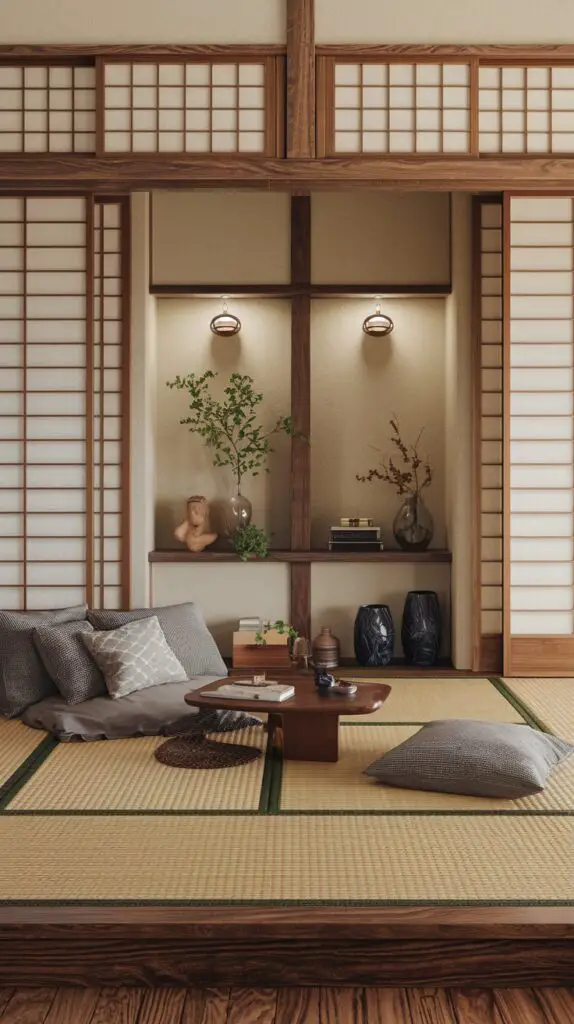
Creating wall niches in your living room lets you display chosen items.
This adds visual interest while keeping the space organized. It’s especially helpful in Japanese-style living rooms that focus on minimalism and careful décor placement.
You can use wall niches to showcase art, plants, or other decorations that fit the Japanese look.
This helps keep a clean and uncluttered space, which is key to the calm atmosphere of a Japanese-style living room.
Besides their decorative role, wall niches offer practical storage solutions.
By adding them to your living room, you can store everyday items nearby without sacrificing style or harmony.
23. Natural Light
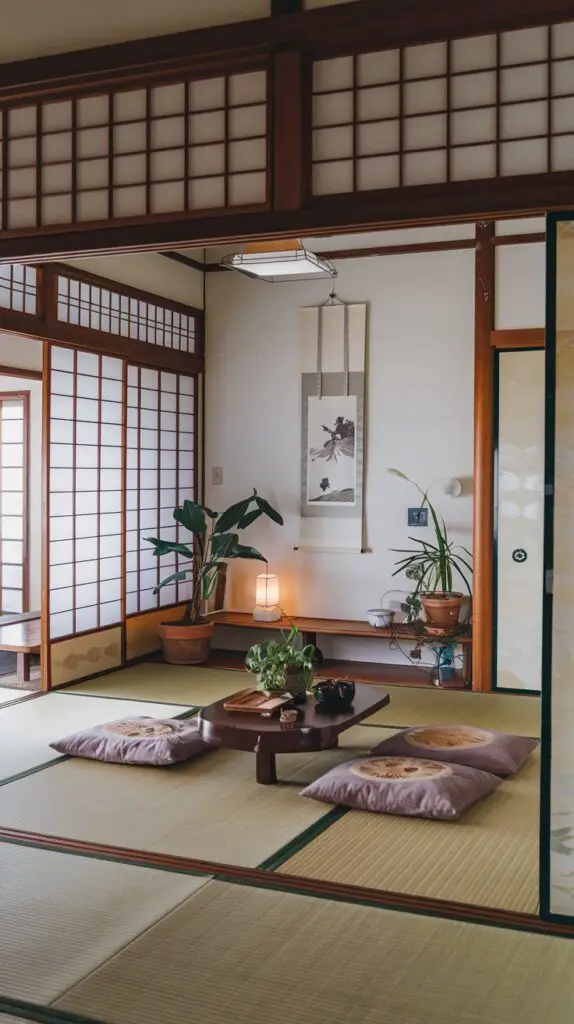
Letting in natural light can make your living room feel bigger and more inviting.
Keep your windows free of heavy curtains or blinds. This trick brightens the space and gives it a fresh, airy feel.
Use light-colored or sheer curtains to maximize sunlight. These options let in natural light and add elegance to your Japanese-style living room.
Place mirrors opposite windows to reflect sunlight around the room.
This technique enhances brightness and makes your space feel open and spacious, fitting well with Japanese style ideas.
24. Bamboo Blinds
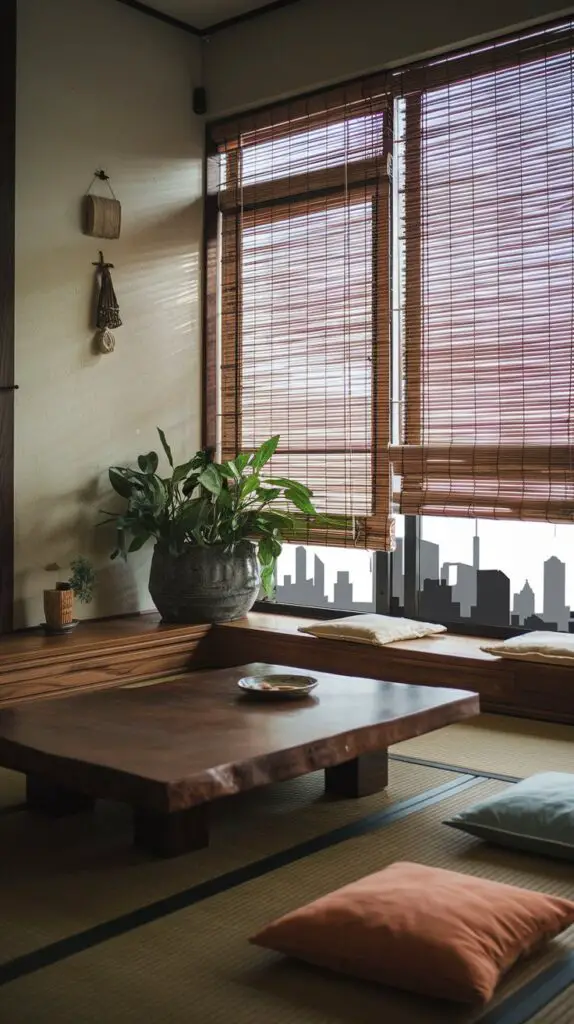
Bamboo blinds can bring elegance to your living room. They are stylish and practical, helping you control sunlight. This makes them ideal for Japanese-style living room ideas.
Choosing bamboo blinds is eco-friendly. Bamboo grows fast and is renewable, making these blinds sustainable. They also keep your room cool by blocking harsh sunlight.
Bamboo blinds are simple to install and maintain.
They come in many styles and colors, so you can find the right match for your décor. Their natural look enhances the calm and minimalist vibe of Japanese-style living rooms.
Conclusion
In summary, these 24 Japanese style living room ideas can help you create a serene and minimalist space.
By incorporating elements like natural materials, low furniture, and simple décor, you can achieve a harmonious and peaceful living room. Start your minimalist makeover today and enjoy a calming, clutter-free environment.
Questions & Answers:
How do natural materials like wood and bamboo enhance a living room?
Natural materials like wood and bamboo create a warm and inviting atmosphere, bring a touch of nature indoors, and are durable and long-lasting, making them a smart investment. They also have a timeless and classic look while being eco-friendly.
What are the benefits of using low furniture in a living room?
Low furniture creates an open and spacious feel, perfect for small living rooms, and adds a touch of Japanese style. It encourages a relaxed and casual atmosphere, enhances the room’s versatility, and highlights minimalist design principles.
Why are sliding doors a good choice for a living room?
Sliding doors save space and add a stylish Japanese touch. They enhance the overall aesthetic, offer flexibility in creating living spaces, and provide both privacy and openness while being functional and practical.
How does a neutral color palette benefit a living room?
A neutral color palette creates a calm and peaceful setting, makes the space look brighter and more spacious, and provides a versatile backdrop for easily switching up décor with accessories to match different seasons or trends.
What is the significance of minimal décor in a Japanese style living room?
Minimal décor emphasizes fewer standout items to avoid crowding the space, incorporates natural elements like wood and bamboo, and uses simple and functional furniture to create a serene and open atmosphere.
What are the advantages of using Shoji screens in a living room?
Shoji screens are beautiful and practical, can divide a room without making it feel closed off, let light through to keep the space bright and airy, and blend well with traditional and modern décor.
How can Tatami mats enhance a living room?
Tatami mats add a touch of Japanese style, are soft and comfortable to walk on, made from durable natural materials like rice straw and rush grass, and can be easily incorporated into various room layouts.
What are the benefits of using paper lanterns in a living room?
Paper lanterns create a cozy atmosphere with gentle, warm light, add Japanese elegance with their minimalist design, are affordable and eco-friendly, and can be reused for different occasions.
How do indoor plants fit into a Japanese style living room?
Indoor plants like bonsai or bamboo enhance the décor, promote a calming atmosphere, require minimal care, and symbolize peace and balance, aligning well with Japanese décor principles.
What are the advantages of using a futon sofa in a living room?
A futon sofa is versatile, comfortable, fits with a minimalist theme, saves space by transforming from a sofa to a bed, adds a touch of Japanese style, is budget-friendly, and can last for years with proper care.
